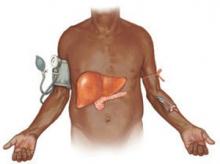ILLUSTRATIVE CASE
Your new patient is a 57-year-old African American man. His blood pressure is 150/95 mm Hg, fasting glucose 115 mg/dL, body mass index 32, and triglycerides 155 mg/dL; he is on no prior medications. During the course of his care you diagnose hypertension with metabolic syndrome and decide to recommend an antihypertensive. Thiazide-type diuretics are your standard initial therapy, but this patient has metabolic syndrome, and you know that certain antihypertensive agents have a more favorable metabolic profile than thiazide diuretics. Furthermore, metabolic differences among races have been touted as reason to use other agents in black patients. Should you recommend a thiazide diuretic, or another agent?
Until now, we’ve had no simple approach to treating hypertension in patients with metabolic syndrome—and half or more of our hypertensive patients over the age of 55 have this disorder.
Now, however, we can base decisions on clinical outcomes data from a subgroup analysis of the Antihypertensive and Lipid-Lowering Treatment to Prevent Heart Attack Trial (ALLHAT).1 This new subgroup analysis supports use of thiazide-type diuretics in these patients—particularly in black patients—despite the more favorable metabolic profile of calcium channel blockers, alpha-blockers, and angiotensin-converting enzyme (ACE) inhibitors.
Cost is no longer as big a factor as it once was, now that ACE inhibitors and alpha-blockers, as well as thiazide diuretics, are available generically.
Does a better metabolic profile improve outcomes?
We have had reason to be concerned about the metabolic adverse effects of thiazide-type diuretics in the past. Studies published before this ALLHAT subgroup analysis showed that hydrochlorothiazide for essential hypertension had adverse effects on potassium, glucose, and lipid metabolism. Some speculated that these changes aggravate the metabolic changes in early diabetes2-4 and may contribute to increased coronary heart disease risk.5,6
FIGURE
Outcomes favor thiazides
We know many physicians who have adopted thiazide-type diuretics as the first-line treatment for hypertension in metabolic syndrome, but until now, data have been inadequate to support this decision.
A subgroup analysis from the ALLHAT1 concludes: “The ALLHAT findings fail to support the preference for calcium channel blockers, alpha-blockers, or angiotensin-converting enzyme inhibitors compared with thiazide-type diuretics in patients with the metabolic syndrome, despite their more favorable metabolic profiles. This was particularly true for black participants.”
| Hypertension Blood pressure target for patients enrolled in the ALLHAT was <140/90 mm Hg | Metabolic syndrome, in the subgroup analysis, was defined as hypertension plus 2 of the following risk factors for coronary heart disease: | ||
| 1. Obesity Body mass index at least 30 | 2. Lipid disorder Fasting triglyceride level >150 mg/dL and high-density lipoprotein cholesterol level <40 mg/dL in men, or <50 mg/dL in women | 3. Glycemic disorder Fasting glucose level >100 mg/dL, or nonfasting glucose level >200 mg/dL, or history of diabetes | |


